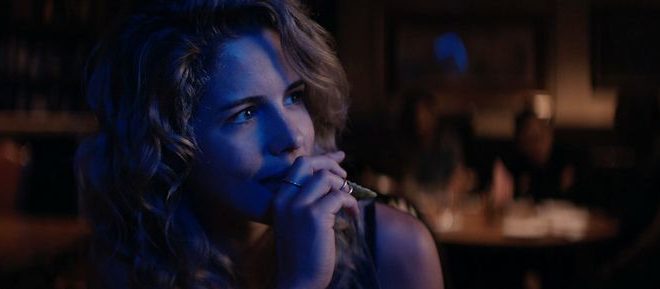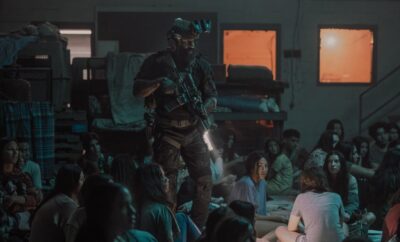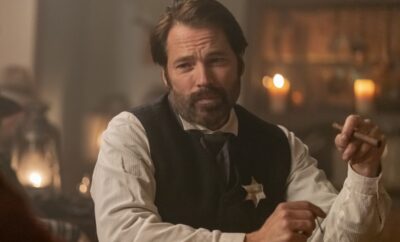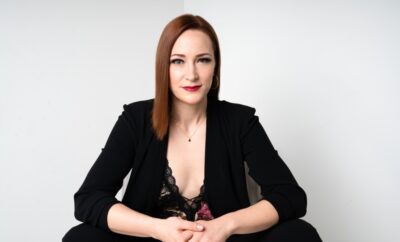
Interviews
Emily Bett Rickards – Funny Story
By: Lisa Steinberg
Q) Walter has this line in the beginning where he says “For someone so small, you wear a huge layer of bitch.” He gives Kim this persona which she sheds in different ways as the film progresses when she is with him and whenever we see her with Nic. She knows Walter’s history and he tries to peg Kim from knowing her for five minutes. What do these separate perspectives say about how each of them sees her and visa versa?
A) I think that is such a major layer of our film – adapting perspective, what we present and who we present to other people might not be our truest selves and what people see might not actually be and is truly a projection of themselves. There was so much stigma around meeting Walter (Matthew Glave) because of the stories Kim had heard from Nic (Jana Winternitz) about her father and his lack of knowing who Kim was and sort of nailing it on the head with all of these boundaries she put up and meeting strangers and not letting herself out into the real world. Meeting someone, you might not know anything about them at all and then just meeting them for the first time you might nail it on the head. He says, “You have barricaded yourself inside,” and that is a major part of who Kim is. She wants to get out of these things that she can’t – that she’s personally inflicted on herself. She has sort of built herself in this cave. Over the course of the film we sort of see that explode and work against her.
Q) We get this quiet moment in the bath tub that Kim seems to reflect on more than just her present, but her past as well. It’s in the tub her solitude literally and figuratively washes over her. Baths signify cleansing, but Kim the entire movie can’t seem to bring herself to come clean to Nic, even with Nic in the tub. Can you talk about the irony of scene and how it plays into the film’s undertones and themes?
A) I think it’s really an honest example of how we, as humans, can react to the world and how it can be dangerous. You talk about this cleansing moment as a moment of lucidity, but it doesn’t honestly mean you are going to live in that moment of lucidity. It is a challenge. You are presented with this moment of lucidity and it is the challenge of life to go and make that a reality, not just a moment in time. It’s so easy to backtrack. We ignore those things sometimes and we don’t accept them as moments of reality because it’s easier to just move about through life with this sort of fake and dishonest trajectory. So, even though she has a moment of clarity it is the challenge of bringing that to fruition.
Q) We see this group of diverse LGBT characters who each bring a beautiful spectrum to the community. Walter asks these stereotypical questions but he isn’t judged, they embrace, engage, and educate. Can you talk about the significance of this scene and how we are more than just the labels and identities people want to put on our sexualities?
A) I don’t think necessarily challenges that. I think it accepts that. It says these are the labels and things that we want to define ourselves as, but really we’re just all people. We share and just accept the fact we can label, but we can also strip the labels away and live your life in a very organic, welcoming a 360-degree perspective. Then, sort of all the bullshit falls away. As they’re educating Walter, all this bullshit just dissolves. When individuals are willing to live such an honest and authentic life, people are afraid of that. People who don’t do that fear that and to see Walter not fear that in that moment is where we go, “Oh.” We get perspective on his life. He’s not a terrible person. We start to warm because his heart is moving so we want to move with him.
Q) I love the way wires in Kimberly’s mind work and how you portray her. You constantly see the emotions turning and her thought process plays out a lot in her eyes and expressions. How did you approach portraying Kim’s evolution through her tragedies?
A) That has a lot to do with Michael [Gallagher] and the writing. What was on the page was honest about the film. It is an extensively written story. As soon as I read it, I said, “I really want to do this movie,” because of the people that were involved. It was beautifully written because it’s written from the heart and it’s written authentically. It made it very easy for me to working with Michael, Jana and Matt. We were just all very willing to accept the story as a whole and collaborate in that realm. Kim is a difficult character. She would be a difficult person. She even finds herself difficult to be around. Knowing that there are people like that in your life and knowing that there are people just trying to do better…That’s sort of what the story is about, just trying to be better and for some reason can’t. But really, honestly, they are working through a place where they wake up one day and the character just wants to have a good day. It’s sort of just accepting the story of what their lives are. Michael and Jana were very, very present through all of that and understanding.
Q) The film is wrought in this poignant and provoking emotional angst where each moment of the movie transitions and feels so palpable from start to finish but it also intertwines these moments of levity that are endearing and disarming. How does the film take these messy and tumultuous interpersonal relationships while maintaining the light and levity in such a brilliantly balanced way?
A) I think it is the honesty. I hate to keep repeating myself on that moment, but it’s because so honest. It’s not glossy. It’s pretty raw. There is not a whole lot of sugar coating from any of the characters. It is a lens into a life in a way. It’s a lens into a life with good things with a wedding, love and friendship and a lot of women coming together. But there is also the raw, the gross, the dirty, the secrets and the shame. Those tumultuous relationships, that kind of energy, only craves authenticity and honesty. With that type of energy, you follow these people with true love and honesty and when those characters meet it’s only a matter of time before those characters unravel and that is something the lens of the film does very, very well.
Q) So much of the movie takes place in this remote rural area that’s Big Sur, Michael Gallagher has this way of making nature become kind of a character in itself. Can you talk about how this setting of the film plays into the themes we see?
A) Road trips do that for us. There is such inertia in this road trip film. There is a destination. It was about the journey and it is about the journey for Kim and Nic. It really is about the journey, but the journey doesn’t stop when you reach your destination. No matter where you go or where you are, you have to be able to face yourself. I think that’s very telling of our environment and landscape along the way. You see this landscape change and it’s really beautiful to see on film places you might never get to go to. Also, you see photographs of places you’ve never been to before and see them in this light, but know the energy of the setting you are in and you just see it as the world. I think Big Sur is somewhere that you would road trip to and it has nature, camping and getting down to your roots. That was something growing up on the coast you sort of dreamed of. Now, we see it photographed a little more recently. Maybe that’s just my experience, but I’ve seen it photographed a little bit more. It was a different experience of knowing about Big Sur when I was a child and it was this way to sort of get back to grounded. I think that’s sort of what it was supposed to be in this film. We’re going to this wedding there and we’re supposed to be getting back to our roots because this is pure and wonderful. The setting that you’re in you’re seeing this sort of ticking time bomb sort of happen and only this beauty can extract that and make that blow up.
Q) We got to see some behind the scenes pictures of you behind the lens. Is being behind the camera something you are working towards or hoping to someday take on yourself?
A) I am, yes. I do like being behind the camera a lot. I actually just grabbed some new gear for a trip that I’m about to embark on. We’re going to do a little site seeing for that. Michael Gallagher was so giving in terms of what I wanted to learn. Every time I walked away from the set I was like, “I didn’t learn enough!” [laughs] I was on a show for seven years and I feel like I walked away from it like, “I still haven’t learned enough!” [laughs] But especially looking back at this film, this was my first time learning about lenses. Though I had been on a TV show for several years Michael was shooting on lenses that I was so attracted to. He taught me about that skill. [laughs] I’m still diving into that. What this film was behind the scenes was just a bunch of people wanting to be creative and I think you can see that in what the film shows. Everyone was friends. Everyone wore hats that weren’t exactly their title. It was a really, really fun experience. It was a long time ago. Talking to you, this is the first time I’ve talked about this film in a year. So, it’s bringing back a lot of cool memories so I’m really grateful.
Q) We get these multidimensional characters who are loving and layered, messy and sometimes self-sabotaging. What do you hope resonates or audiences take away from seeing Funny Story?
A) I like films and TV where characters are not perfect. The imperfections, those are the things that we expect in the people that we love. I do feel like we relate to characters that are imperfect. They are interesting. Being perfect and cookie cutter isn’t interesting. [laughs] But if you don’t expect imperfections, where are we moving towards? It’s about finding people around you that balance you and accept that about you and you accept about yourself. I think that people can relate to this film in many ways. There are some stories where people will watch this and maybe it will hit a little too close to home. As long as you’re feeling something, you haven’t wasted your time. I think that’s what growth is and I think that is important. That’s our film. I hope you like it. If you don’t like it, at least you felt that you didn’t like it. [laughs] I think whatever you do with your time it’s important to make sure you feel something.
Q) The movie also doesn’t necessarily give you a happy ending. At the end of this movie, we get even more raw emotion, confusion and chaos. We still get a little bit of hope at the end, I suppose.
A) I think even in our darkest times there is always hope. Hope is a very dangerous ally that where we end up with that sort of unfinished foe is what life is. That bow is never going to be perfectly tied. You can recreate it and do other things with it. I’m more into certain films that I walk away where I’ll call my writing partners and say, “Uh! That was disgusting!” [laughs] Or, “I feel inspired.” Or, “I feel really weak or strong.” As long as you have something of those, it’s usually not because someone perfectly wrapped the storyline up for you.





You must be logged in to post a comment Login